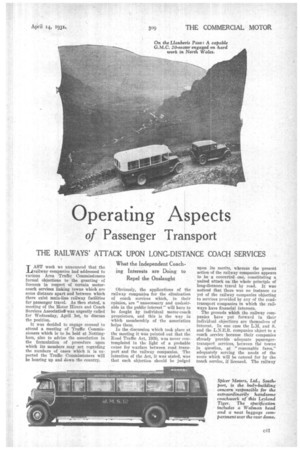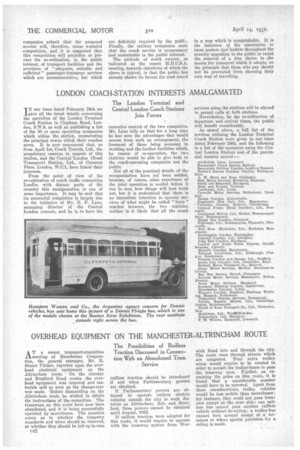Operating Aspects
Page 63

Page 64

If you've noticed an error in this article please click here to report it so we can fix it.
of Passenger Transport
THE RAILWAYS' ATTACK UPON LONG-DISTANCE COACH SERVICES
What the Independent Coaching Interests are Doing to Repel the Onslaught L"Tweek we announced that the railway companies had addressed to various Area Traffic Commissioners formal objections to the granting of licences in respect of certain motorcoach services linking towns which are some distance apart and between which there exist main-line railway facilities for passenger travel. As then stated, a meeting of the Motor Hirers and Coach Services Associatioit was urgently called for Wednesday, April 1st, to discuss the position.
It was decided to engage counsel to attend a meeting of Traffic Commissioners which is to be held at Nottingham, also to advise the association in the formulation of procedure upon which its members may act regarding the numbers of cases which it is expected the Traffic Commissioners will be hearing up and down the country.
Obviously, the applications of the railway companies for the elimination of coach services which, in their opinion, are " unnecessary and undesirable in the public interest" will have to be fought by individual motor-coach proprietors, and this is the way in
• which membership of the association helps them.
In the discussion which took place at the meeting it was pointed out that the Road Traffic Act, 1930, was never contemplated in the light of a probable cause for warfare between road transport and the railway companies. The intention of the Act, it was stated, was that each objection should be judged upon its merits, whereas the present action of the railwaycompanies appears to be a concerted one, constituting a united attack on the whole principle of long-distance travel by road. It was noticed that there was no instance as yet of the railway companies 'objecting to services provided by any of the roadtransport companies in which the railways have financial interests.
The grounds which the railway companies have put forward in their individual objections are themselves of interest. In One ease the L.M. and S. and the L.N.E.R. companies object to a coach service because their companies already provide adequate passengertransport services, between the towns in question, at " reasonable fares." adequately serving the needs of the route which will be catered for by the coach service, if licensed. The railway
companies submit that the proposed service will, therefcire, cause wasteful competition, and it is suggested that this competition Will prejudice or prevent the co-ordination, in the public interest, of transport facilities and the provision of "adequate, suitable and sufficient" passenger-transport services which are unremunerative, but which are definitely required by the publk. Finally, the railway companies state that the coach service is unnecessary and .undesirable in the public interest.
The attitude of coach owners, as indicated at the recent M.H.C.S.A. meeting, towards objections of which the above is typical, is that the public has already shown its favour for road travel in a way which is unmistakable. It is the intention of the association to issue posters and leaflets throughout the country appealing to the public to resist the removal of a free choice in the means for transport which it adopts, on the principle that those who pay should not be prevented from choosing their own way of travelling.












































































































